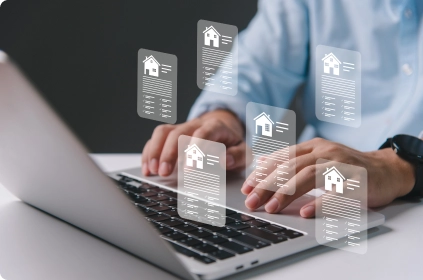Turning your home into an investment property can be a smart financial move, especially if you’re planning to buy a second home or seeking an additional income stream. Also, renting out your current property not only provides extra monthly income, but also offers potential tax advantages, such as deductions for mortgage interest, property taxes, and maintenance costs.
If you’re planning to turn your home into an investment property, it’s important to understand every step involved like financial preparation, understanding tax obligations, and adjusting your mortgage.
How To Turn Your Home Into An Investment Property
When changing from owner-occupier to investment property, it’s important to follow key steps to ensure everything goes smoothly.
1. Consult a Financial Advise
Speak with a financial advisor or accountant to understand the tax implications, such as rental income and possible deductions. This ensures that you’re well-prepared for the financial shift and can optimise your tax strategy.
2. Review Your Loan Terms
Check with your lender to ensure your loan allows for this transition. You may need to switch to an investment loan with different terms.with different terms, often ranging from 25 to 30 years. Some lenders have simplified this process with a letter or form, without requiring a full reassessment.
3. Prepare Your Property for Rent
Make any necessary repairs or upgrades to make your home attractive to potential tenants. A well-maintained property not only appeals to tenants but also helps maximise your rental income.
4. Capital Gains Tax (CGT) and Negative Gearing
If you rent out your home, it becomes a taxable asset for CGT purposes. You may also be eligible for negative gearing, where rental income is less than the expenses, allowing you to claim the loss as a tax deduction. However, you cannot negatively gear your primary residence unless it is generating rental income, which only applies once it’s converted to an investment property.
5. Adjust Insurance Coverage
Notify your insurance provider that the property is being rented. Homeowner’s insurance may not cover rental properties, so switching to landlord insurance is essential to protect against rental-related risks.
6. Decide On Property Management
Consider whether to self-manage the property or hire a property manager. A property manager can take care of tenant selection, rent collection, and maintenance, but comes at a cost.
7. Calculate Your Rental Yield
Use a mortgage repayment calculator to assess your rental yield and determine if the rental income will cover your mortgage and other expenses. Proper calculations will help you understand the financial viability of renting out the property.
Tax Implications Of Turning Home Into Investment Property
Income Tax Implications
If you rent it out, the net rental income needs to be declared in your tax return just like for any other investment property. You can claim running costs like rates and water as well as non cash costs such as depreciation.Please refer to our investment property deductions page for more information.
Where the property is jointly owned, the split of rental income has to match the ownership interest. You cannot split it all to one family member arbitrarily. You can claim back interest on the loan that was used to originally buy the property. However, this isn’t always as simple as it first appears.
Note: The home loan may not be entirely tax deductible.
If you have a loan, you are limited to claiming interest on the loan value before any other drawings. That is, the balance of the loan that was originally used to buy the property. For example, you bought the home with a $400,000 loan and paid back $100,000 of it over time. Then you redraw $50,000 to buy a new car. Although your loan is $350,000, you can only claim interest on the $300,000 that relates to the original purchase. You can help get around this issue by using an investment loan offset account.
Capital Gains Tax Implications
If you move out of your home and buy another home to live in, then the old home becomes a taxable asset. When you sell it you need to calculate the capital gain made on the sale, but this gain is reduced proportionately based on how long you used it as your home.
For example, you lived in the old home for 15 years and rented it out for 10 years. Your capital gain is reduced by 60% (15 years lived in/25 years owned).
If you move out of your home and rent another home, then the old home becomes a taxable asset. When you sell it you need to calculate the capital gain made on the sale, but this gain can be reduced.
First, it is reduced proportionately based on how long you used it as your home. Second, you can choose to treat the property as your principal place of residence for up to 6 more years after moving out, provided you do not buy another home to live in.
For example, if you lived in the old home for 15 years and rented it out for 10 years, you can choose to apply the extra six-year exemption. Your capital gain is reduced by 84%: (15 years lived in + 6 year extra exemption) / 25 years owned.
Please use our capital gains tax (CGT) calculator to get an estimate.

Elevate Your Investment Game With The 360° Home Loan Assessor
- Determine the right deposit required for your next investment property
- Ensure complete transparency on additional expenses related to property investment
- Explore interest-rate options based on your situation
Frequently Asked Questions
How Soon Can I Rent Out My Home After Buying It As An Owner-Occupied Property?
Generally, most lenders require you to live in your owner-occupied property for at least 6-12 months before renting it out. However, if your circumstances change, such as relocating for work, some lenders may allow you to rent out the property sooner. Always check with your lender to ensure you’re meeting their terms and conditions.
Can You Negatively Gear Your Primary Residence?
Can I Live In My Investment Property?
Can I Rent Out A Part Of My Home?
Talk To An Expert
Need the help of a mortgage broker? Call us on 1300 889 743 or enquire online.
Speak Now